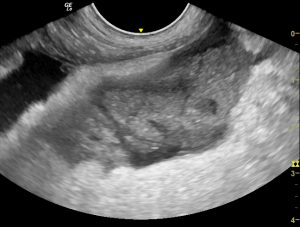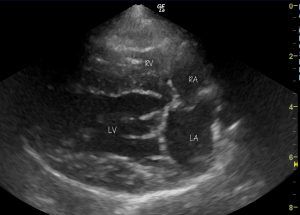Putative acute respiratory distress syndrome (ARDS) secondary to severe acute pancreatitis in a Cocker Spaniel
Lung ultrasound is always a good thing to include in a systematic ultrasound examination. You never know when you’ll find something which might affect case management.
This is the pancreas of an acutely unwell, vomiting 7 y.o. Cocker Spaniel with no prior history of respiratory problems:

That’s a pretty convincing pancreatitis. Both left and right lobes are affected and there is no evidence of any alternative abdominal cause of the problem.
I guess we expect dogs with severe pancreatitis to be tachypnoeic because of pain and this patient certainly is: resting resp rate 55/minute. However, this dog’s lungs are markedly abnormal on ultrasonography:
Those coalescing B lines (ultrasound lung rockets) are the kind of thing you expect with pulmonary oedema in the broadest sense. Differentials would include cardiogenic pulmonary oedema, iatrogenic overhydration, pulmonary thromboembolism, acute respiratory distress syndrome (ARDS), near-drowning, post-electrocution and so forth.
This dog’s heart certainly doesn’t suggest either L CHF or overhydration:

right long axis 4 chamber view of the heart
In fact the LV lumen:wall ratio is only 1.7:1 -implying hypovolaemia is more likely.
There’s no evidence of pulmonary hypertension to support the idea of pulmonary thromboembolism (either secondary to pancreatitis or to other causes such as angiostrongylosis).
It’s difficult (possibly impossible) to positively prove a diagnosis of ARDS but I suspect that is the most likely cause of this lung appearance.





